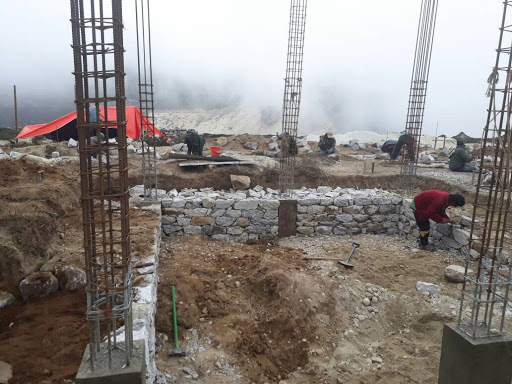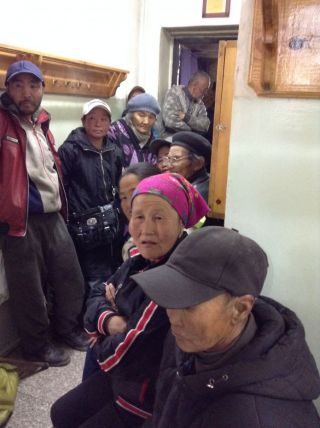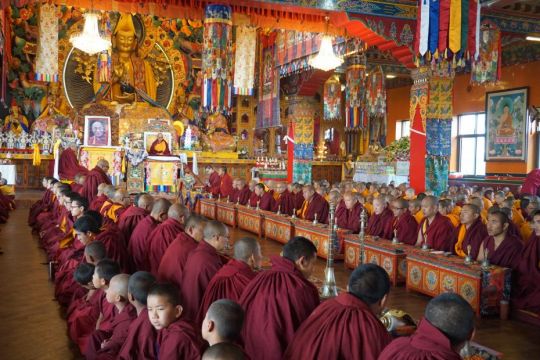- Home
- FPMT Homepage
Foundation for the Preservation of the Mahayana Tradition
The FPMT is an organization devoted to preserving and spreading Mahayana Buddhism worldwide by creating opportunities to listen, reflect, meditate, practice and actualize the unmistaken teachings of the Buddha and based on that experience spreading the Dharma to sentient beings. We provide integrated education through which people’s minds and hearts can be transformed into their highest potential for the benefit of others, inspired by an attitude of universal responsibility and service. We are committed to creating harmonious environments and helping all beings develop their full potential of infinite wisdom and compassion. Our organization is based on the Buddhist tradition of Lama Tsongkhapa of Tibet as taught to us by our founders Lama Thubten Yeshe and Lama Thubten Zopa Rinpoche.
- Willkommen
Die Stiftung zur Erhaltung der Mahayana Tradition (FPMT) ist eine Organisation, die sich weltweit für die Erhaltung und Verbreitung des Mahayana-Buddhismus einsetzt, indem sie Möglichkeiten schafft, den makellosen Lehren des Buddha zuzuhören, über sie zur reflektieren und zu meditieren und auf der Grundlage dieser Erfahrung das Dharma unter den Lebewesen zu verbreiten.
Wir bieten integrierte Schulungswege an, durch denen der Geist und das Herz der Menschen in ihr höchstes Potential verwandelt werden zum Wohl der anderen – inspiriert durch eine Haltung der universellen Verantwortung und dem Wunsch zu dienen. Wir haben uns verpflichtet, harmonische Umgebungen zu schaffen und allen Wesen zu helfen, ihr volles Potenzial unendlicher Weisheit und grenzenlosen Mitgefühls zu verwirklichen.
Unsere Organisation basiert auf der buddhistischen Tradition von Lama Tsongkhapa von Tibet, so wie sie uns von unseren Gründern Lama Thubten Yeshe und Lama Thubten Zopa Rinpoche gelehrt wird.
- Bienvenidos
La Fundación para la preservación de la tradición Mahayana (FPMT) es una organización que se dedica a preservar y difundir el budismo Mahayana en todo el mundo, creando oportunidades para escuchar, reflexionar, meditar, practicar y actualizar las enseñanzas inconfundibles de Buda y en base a esa experiencia difundir el Dharma a los seres.
Proporcionamos una educación integrada a través de la cual las mentes y los corazones de las personas se pueden transformar en su mayor potencial para el beneficio de los demás, inspirados por una actitud de responsabilidad y servicio universales. Estamos comprometidos a crear ambientes armoniosos y ayudar a todos los seres a desarrollar todo su potencial de infinita sabiduría y compasión.
Nuestra organización se basa en la tradición budista de Lama Tsongkhapa del Tíbet como nos lo enseñaron nuestros fundadores Lama Thubten Yeshe y Lama Zopa Rinpoche.
A continuación puede ver una lista de los centros y sus páginas web en su lengua preferida.
- Bienvenue
L’organisation de la FPMT a pour vocation la préservation et la diffusion du bouddhisme du mahayana dans le monde entier. Elle offre l’opportunité d’écouter, de réfléchir, de méditer, de pratiquer et de réaliser les enseignements excellents du Bouddha, pour ensuite transmettre le Dharma à tous les êtres. Nous proposons une formation intégrée grâce à laquelle le cœur et l’esprit de chacun peuvent accomplir leur potentiel le plus élevé pour le bien d’autrui, inspirés par le sens du service et une responsabilité universelle. Nous nous engageons à créer un environnement harmonieux et à aider tous les êtres à épanouir leur potentiel illimité de compassion et de sagesse. Notre organisation s’appuie sur la tradition guéloukpa de Lama Tsongkhapa du Tibet, telle qu’elle a été enseignée par nos fondateurs Lama Thoubtèn Yéshé et Lama Zopa Rinpoché.
Visitez le site de notre Editions Mahayana pour les traductions, conseils et nouvelles du Bureau international en français.
Voici une liste de centres et de leurs sites dans votre langue préférée
- Benvenuto
L’FPMT è un organizzazione il cui scopo è preservare e diffondere il Buddhismo Mahayana nel mondo, creando occasioni di ascolto, riflessione, meditazione e pratica dei perfetti insegnamenti del Buddha, al fine di attualizzare e diffondere il Dharma fra tutti gli esseri senzienti.
Offriamo un’educazione integrata, che può trasformare la mente e i cuori delle persone nel loro massimo potenziale, per il beneficio di tutti gli esseri, ispirati da un’attitudine di responsabilità universale e di servizio.
Il nostro obiettivo è quello di creare contesti armoniosi e aiutare tutti gli esseri a sviluppare in modo completo le proprie potenzialità di infinita saggezza e compassione.
La nostra organizzazione si basa sulla tradizione buddhista di Lama Tsongkhapa del Tibet, così come ci è stata insegnata dai nostri fondatori Lama Thubten Yeshe e Lama Zopa Rinpoche.
Di seguito potete trovare un elenco dei centri e dei loro siti nella lingua da voi prescelta.
- 欢迎 / 歡迎
简体中文
“护持大乘法脉基金会”( 英文简称:FPMT。全名:Foundation for the Preservation of the Mahayana Tradition) 是一个致力于护持和弘扬大乘佛法的国际佛教组织。我们提供听闻,思维,禅修,修行和实证佛陀无误教法的机会,以便让一切众生都能够享受佛法的指引和滋润。
我们全力创造和谐融洽的环境, 为人们提供解行并重的完整佛法教育,以便启发内在的环宇悲心及责任心,并开发内心所蕴藏的巨大潜能 — 无限的智慧与悲心 — 以便利益和服务一切有情。
FPMT的创办人是图腾耶喜喇嘛和喇嘛梭巴仁波切。我们所修习的是由两位上师所教导的,西藏喀巴大师的佛法传承。
繁體中文
護持大乘法脈基金會”( 英文簡稱:FPMT。全名:Found
ation for the Preservation of the Mahayana Tradition ) 是一個致力於護持和弘揚大乘佛法的國際佛教組織。我們提供聽聞, 思維,禪修,修行和實證佛陀無誤教法的機會,以便讓一切眾生都能 夠享受佛法的指引和滋潤。 我們全力創造和諧融洽的環境,
為人們提供解行並重的完整佛法教育,以便啟發內在的環宇悲心及責 任心,並開發內心所蘊藏的巨大潛能 — 無限的智慧與悲心 – – 以便利益和服務一切有情。 FPMT的創辦人是圖騰耶喜喇嘛和喇嘛梭巴仁波切。
我們所修習的是由兩位上師所教導的,西藏喀巴大師的佛法傳承。 察看道场信息:
- FPMT Homepage
- News/Media
-
- Study & Practice
-
-
- About FPMT Education Services
- Latest News
- Programs
- New to Buddhism?
- Buddhist Mind Science: Activating Your Potential
- Heart Advice for Death and Dying
- Discovering Buddhism
- Living in the Path
- Exploring Buddhism
- FPMT Basic Program
- FPMT Masters Program
- FPMT In-Depth Meditation Training
- Maitripa College
- Lotsawa Rinchen Zangpo Translator Program
- Universal Education for Compassion & Wisdom
- Online Learning Center
-
- Prayers & Practice Materials
- Overview of Prayers & Practices
- Full Catalogue of Prayers & Practice Materials
- Explore Popular Topics
- Benefiting Animals
- Chenrezig Resources
- Death & Dying Resources
- Lama Chopa (Guru Puja)
- Lama Zopa Rinpoche: Compendium of Precious Instructions
- Lama Zopa Rinpoche: Life Practice Advice
- Lama Zopa Rinpoche Practice Series
- Lamrim Resources
- Mantras
- Prayer Book Updates
- Purification Practices
- Sutras
- Thought Transformation (Lojong)
- Audio Materials
- Dharma Dates - Tibetan Calendar
- Translation Services
- Publishing Services
- Ways to Offer Support
- Prayers & Practice Materials
-
- Teachings and Advice
- Find Teachings and Advice
- Lama Zopa Rinpoche Advice Page
- Lama Zopa Rinpoche: Compendium of Precious Instructions
- Lama Zopa Rinpoche Video Teachings
- ༧སྐྱབས་རྗེ་བཟོད་པ་རིན་པོ་ཆེ་མཆོག་ནས་སྩལ་བའི་བཀའ་སློབ་བརྙན་འཕྲིན།
- Podcasts
- Lama Yeshe Wisdom Archive
- Buddhism FAQ
- Dharma for Young People
- Resources on Holy Objects
- Teachings and Advice
-
-
*If a menu item has a submenu clicking once will expand the menu clicking twice will open the page.
-
-
- Centers
-
- Teachers
-
- Projects
-
-
-
-
*If a menu item has a submenu clicking once will expand the menu clicking twice will open the page.
-
-
- FPMT
-
-
-
-
-
Whether one believes in a religion or not, and whether one believes in rebirth or not, there isn’t anyone who doesn’t appreciate kindness and compassion.
His Holiness the Dalai Lama
-
-
-
- Shop
-
-
-
The Foundation Store is FPMT’s online shop and features a vast selection of Buddhist study and practice materials written or recommended by our lineage gurus. These items include homestudy programs, prayers and practices in PDF or eBook format, materials for children, and other resources to support practitioners.
Items displayed in the shop are made available for Dharma practice and educational purposes, and never for the purpose of profiting from their sale. Please read FPMT Foundation Store Policy Regarding Dharma Items for more information.
-
-
Projects
1
Grant Offered to New Stupa Being Built in Thame, Solo Khumbu, Nepal

A puja was offered on the site of the new large stupa in Thame, Solo Khumbu.
A large stupa is being built in Thame in the Solo Khumbu district of Nepal to replace one that was destroyed in the 2015 earthquake. The new stupa, which will stand nearly 44 feet tall with a base measuring 56 feet across, will be larger than the one which previously stood on the site.
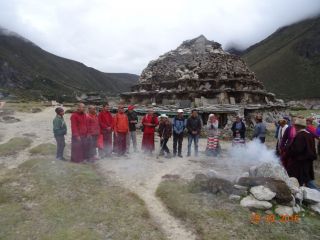
The site of the destroyed stupa in Thame, Solo Khumbu.
About the benefits of building stupas, Lama Zopa Rinpoche has said:
“By building a stupa, without words we are continually liberating so many sentient beings. Every day, the stupa plants the seed of enlightenment and purifies anybody who sees, touches, remembers, talks or dreams about the stupa. This includes insects that touch the stupa. The stupa is meaningful to behold, and it liberates many sentient beings, insects and humans, every day.
“When the wind touches a stupa—especially if it has the four dharmakaya relics inside—the wind becomes blessed. Then, wherever the wind goes and whoever it touches, it liberates them from the lower realms, by purifying their negative karma. When rain falls on the stupa, that water liberates any being it touches—all the worms in the ground etc, are liberated from the lower realms. It is similar with dust.”
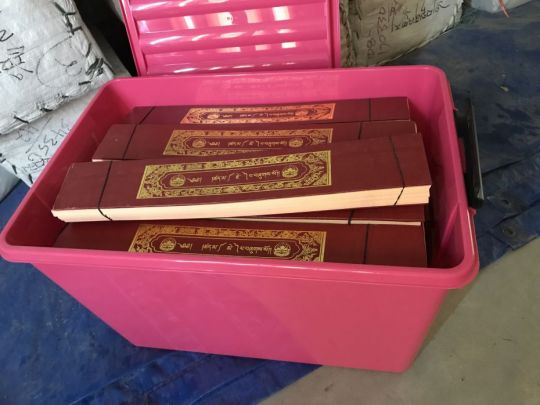
This stupa will be filled and consecrated according to instruction with holy objects and precious materials such as Dharma texts.
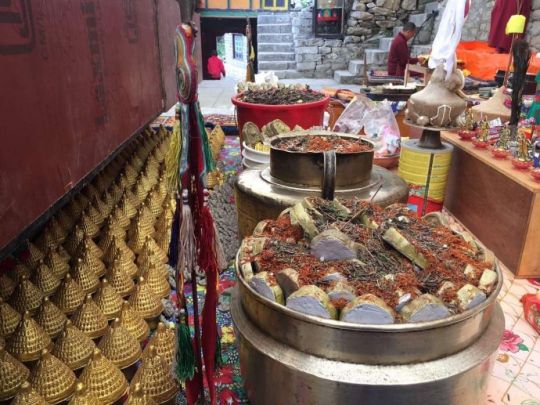
The stupa will be filled with holy images and objects, mantras and the relics of holy beings.
This new stupa project is being managed by Tenpa Choden from Kopan Monastery. The Holy Objects Fund was very pleased to offer US$100,000 toward this stupa which will have a final cost of approximately $US400,000. This very large and impressive stupa will bring ongoing benefit to all sentient beings who make contact with it.
We look forward to providing more updates and details on this project as it progresses.
You can watch a short video of a puja being offered on the site of this new stupa:
www.youtube.com/watch?v=Mts44pLHVc8&feature=youtu.be
If you would like to contribute to the building of holy objects around the world, you are welcome to offer any amount to the Holy Objects Fund which contributes to the creation of stupas, prayer wheels and statues.
- Tagged: holy object fund, holy objects, stupa fund, stupas, thame
27
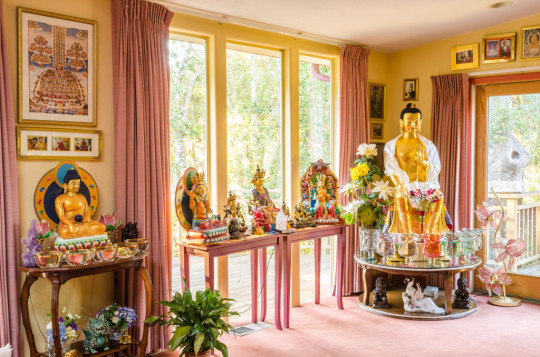
The extensive offerings at Rinpoche’s residences consist of hundreds of saffron-filled water bowls that are offered daily, thousands of light offerings as well as an extensive flower garden. Photo by Chris Majors.
Resident Sangha at Lama Zopa Rinpoche’s residences in Washington State and California, USA, offer weekly animal liberation practice and charity for ants, extensive daily offering practices, make tsa-tsas and stupas daily, and engage in nightly Dharma protector practices and sur offering. All of this is done with extensive dedications and prayers for the entire FPMT organization and all beings, as requested by Lama Zopa Rinpoche.
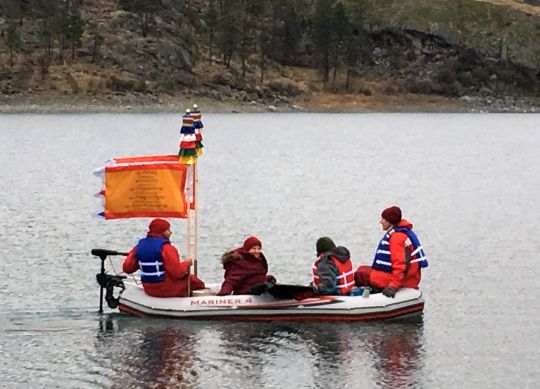
Sangha blessing Lake Omak, Washington, USA, November 2016. Photo by Ven. Holly Ansett.
Last November Rinpoche blessed several lakes located near his Washington State residence, Buddha Amitabha Pure Land (BAPL), using a variety of methods to bring the most benefit. Rinpoche asked the Sangha, in his absence, to keep going out on the lakes regularly, in order to continue to benefit all of the fish and other living beings. They were unable to do this over the winter months, but have picked up these practices again now that the ice and snow has thawed.
Approximately 70,400 animals were liberated at Rinpoche’s houses in 2016. Not only were the animals saved from untimely death by Sangha, but they were also taken around an incredible amount of holy objects, mantras were recited and blown on them, and they were carefully placed where they could live out the rest of their lives. When Sangha finish these liberations, they make strong prayers for all those who are sick, have recently died, or who have requested prayers. This is one of the most beneficial aspects of this practice as the merit is shared among so many.
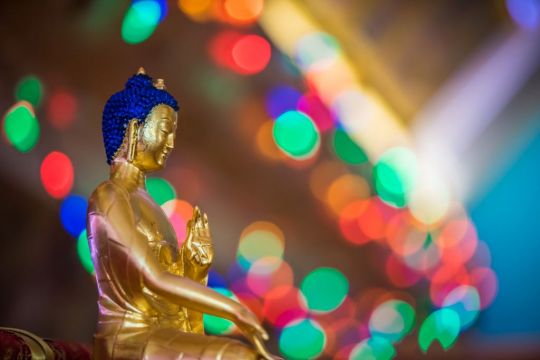
Buddha statue with extensive lights at Buddha Amitabha Pure Land. Photo by Chris Majors.
Resident Sangha make thousands of light and water offerings daily. Gorgeous flowers adorn Rinpoche’s garden. About the benefits of offering to holy objects, Rinpoche has said, “We are not aware of the limitless skies of benefits we achieve from the practice of offering, what we can achieve and enjoy from life to life,” in Extensive Offering Practice to Accumulate the Most Extensive Merit. “Even while you are in samsara, you enjoy good rebirths, wealth, and every happiness. Even just the samsaric perfections are amazing, without adding all those incredible realizations that allow us to offer deep benefit to sentient beings, liberating them from oceans of samsaric suffering and its cause, delusion and karma.” Rinpoche encourages extensive offerings around the world.
Please rejoice in the ongoing beneficial activity of the Sangha at Rinpoche’s residences. This is an incredible offering on behalf of the entire FPMT organization enthusiastically maintained by the resident Sangha.
Lama Zopa Rinpoche Bodhichitta Fund enables Rinpoche’s compassionate service to others to flourish. All the offerings from the fund are used toward the creation of holy objects and extensive offerings around the world; sponsoring young tulkus, high lamas and Sangha in India, Nepal, Tibet and the West; supporting FPMT centers, projects and services; sponsoring Dharma retreats and events; funding animal liberations and blessings, and much more.
20
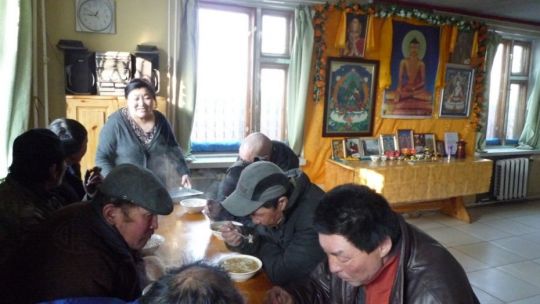
Approximately 80 destitute people are offered meals daily through Lamp of the Path soup kitchen.
Lamp of the Path NGO, a project of FPMT Mongolia, has been offering free meals and a regular free health clinic to the poor and homeless living in Ulaanbaatar, Mongolia for many years.

No repairs have been made the community center since 2003 and the facility is in major need of repair.
In 2016, 21,000 meals were offered to the underprivileged living in the area. Many are single mothers, the elderly, and children with little or no housing and no access to water or sewage. Woman-headed households served at the soup kitchen are a group significantly disadvantaged both financially and by reason of social and psychological stresses.
The cost of food for one week averages US$415. Last year, during the spring and summer months, a successful vegetable garden was set up and this provided nutritious produce for the daily meals. Two Mongolian women are employed as kitchen staff.
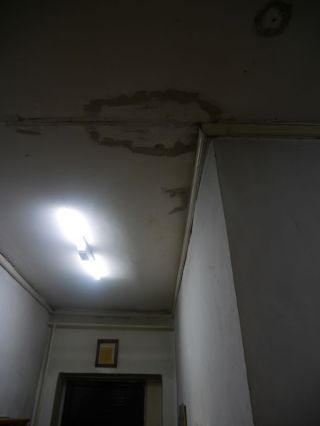
In 2017, much needed repairs will be made to the community center.
The community center had not been updated or repaired since 2003 and at the end of 2016 some repairs were completed. Major and much needed renovation is planned for 2017. For example: The roof has deteriorated over the years causing major leaks and dripping; the building walls are so thin that the heat loss becomes a real issue through the winter season; and the ceiling and inner walls are extremely deteriorated due to leaks and damage.
The annual budget for 2017, including the cost to complete these urgent repairs, is US$51,500.
Due to the kindness of a generous benefactor, the Social Services Fund has been able to offer a US$30,000 grant toward the 2017 operating expenses. This is the fifth consecutive year that we have offered significant support to the the Lamp of the Path NGO in Mongolia, allowing the project to continue.
If you would like to support the Social Services Fund and help ensure grants such as this can continue, you can read more about the charitable projects this fund supports or donate any amount to the fund itself.
- Tagged: mongolia, offering food, social services, soup kitchen
13
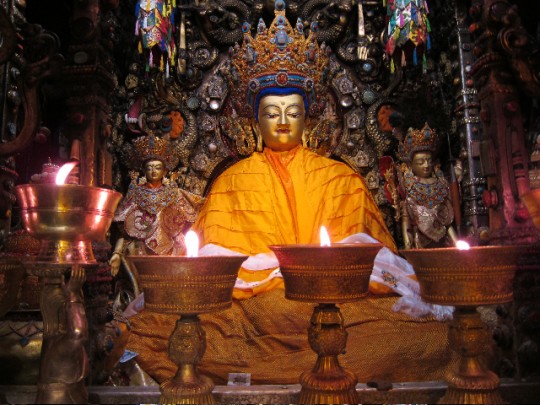
The most precious Jowo Buddha statue in Tibet is offered gold and robes every month through the Puja Fund
Every month the Puja Fund sponsors pujas and offerings dedicated to the long life of His Holiness the Dalai Lama; the removal of obstacles to all FPMT Dharma activities; FPMT students; benefactors of every FPMT center, service, and project, as well as their families; all beings who have passed away; and benefactors of the FPMT Puja Fund.
On the eighth day of every month of the Tibetan calendar, a Medicine Buddha puja is sponsored at Sera Je Monastery and offered by 2,000 monks. A small money offering, bread, and tea are given to every participating monk and the cost of light and torma offerings for the puja are sponsored.
On the twenty-ninth day of every month, an important day to offer protector pujas, forty of the most senior monks of Sera Je Monastery, who specialize in the practice of Most Secret Hayagriva, are sponsored to perform the Extensive Most Secret Hayagriva puja (Hayagriva Tsog Kong). This is an all-day puja with an elaborate torma offering, extensive prayers, and meditation. A money offering, breakfast, lunch, and dinner are given to each participating monk; and the Puja Fund also offers the cost of extensive torma offerings for the puja.
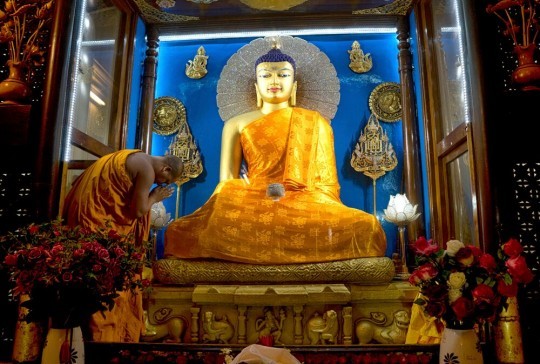
Robes are offered every month to the Buddha statue in Mahabodhi temple, Bodhgaya, India. Photo by Andy Melnic.
A new set of robes is offered every month to the precious Buddha statue inside the Mahabodhi Stupa in Bodhgaya, India. Thanks to Root Institute for kindly organizing this every month.
Every month on the full moon the Puja Fund sponsors the offering of gold and robes to the most holy Jowo Buddha statue in Tibet.
Lama Zopa Rinpoche has taught extensively on the benefits of offering to statues of Buddha. “If someone offers a small flower or rice to a Buddha statue, a stupa, or scripture then the benefit extends from then up to enlightenment. Amazing, amazing,” Rinpoche has said. “It is said in the sutra Piled Flowers, on top of that benefit, you achieve ultimate happiness, liberation from the causes of delusion and karma, and on top of that full enlightenment, all the realizations and omniscient mind.”
Please rejoice in these monthly pujas and offerings to Sangha and holy objects sponsored by the Puja Fund. These pujas and practices are a direct and important investment in FPMT’s current and future successes.
The Puja Fund was established by Lama Zopa Rinpoche to provide resources for pujas and offerings dedicated to the long life of His Holiness the Dalai Lama and to the success of all the FPMT centers, projects, services, students, benefactors, and those serving the organization in any way.
Learn more about the Puja Fund and FPMT’s other extensive charitable activity.
- Tagged: puja fund
10
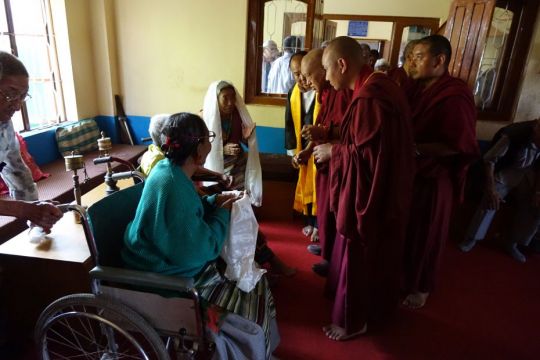
Last year Lama Zopa Rinpoche visited the Lugsung Samdupling Home for the Aged and Disabled in Bylakuppe, India, and spent time with the residents there.
Last year, the Social Services Fund offered several grants to elderly homes in India occupied by Tibetan refugees. Without such facilities, many elderly, first-wave Tibetan refugees, who often are without families of their own, have little prospect of accommodation or support. By offering assistance in this way, FPMT can help repay the kindness and bravery of the Tibetan people.
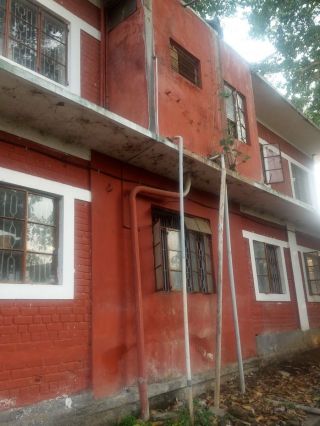
Built in 1968, the current accommodation must be demolished and new accommodation built
One residential home that needs a lot of support is the Lugsung Samdupling Home for the Aged and Disabled in Bylakuppe, India. The home is building ten essential new rooms for residents that will feature excellent ventilation and security.
The existing building was constructed in 1968 and is on the verge of collapse. The foundation and walls cannot withstand renovation and thus will be demolished and a new permanent building constructed in its place. The new accommodation will be designed in blocks, allowing residents to enjoy increased privacy.
The Social Services Fund is very pleased to offer a grant for five of the ten new rooms, the remaining five being covered by another sponsor.
We will continue to support elderly Tibetan refugees in whatever way we are able. For example, we have already begun to assess where holy objects can be built so that residents of homes such as the Lugsung Samdupling Home for the Aged and Disabled can benefit from their blessings.
FPMT is committed to assisting Tibetan communities in need. You can read about recent support given to a Tibetan settlement for refugees in South India, including a grant toward a new community center and food for an elderly home.
- Tagged: elderly, elderly home, social services fund, tibetan refugees
6
Skies of Merit on Saka Dawa, June 9
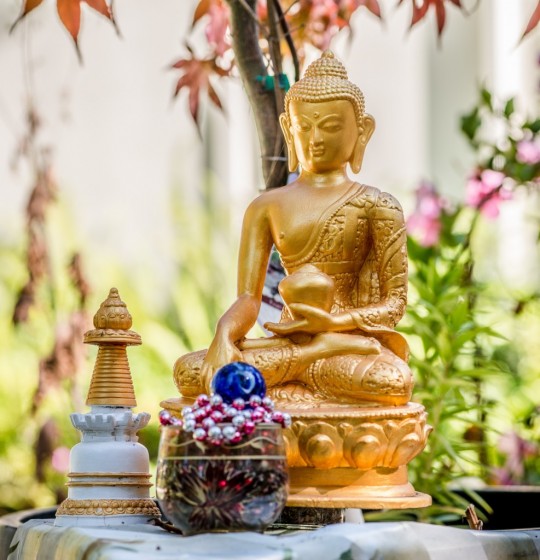
Shakyamuni Buddha with offerings, Kachoe Dechen Ling, California, USA. Photo by Chris Majors.
Each year on Saka Dawa—the celebration of Lord Buddha’s birth, enlightenment and parinirvana—Buddhist practitioners around the world engage in many auspicious and merit-making activities such as personally devoting oneself to the path; sponsoring beneficial pujas, practices, and prayers; and making extensive offerings to our teachers, holy objects, and auspicious charitable activities. This year, Saka Dawa takes place on June 9.
We would like to invite you to participate and rejoice in this holy day of incredible virtuous activity.
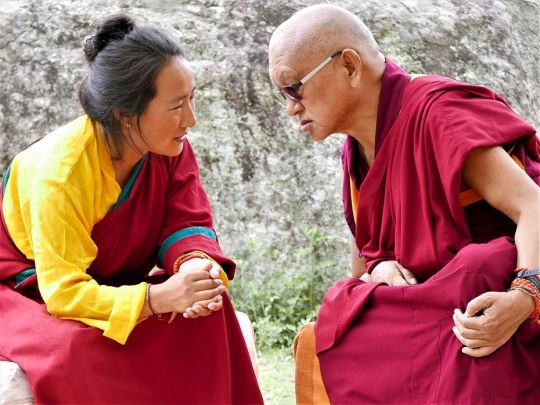
Khadro-la (Rangjung Neljorma Khadro Namsel Drönme) with Lama Zopa Rinpoche, Bhutan, May 2016. Photo by Ven. Roger Kunsang.
Long Life Prayers for Lama Zopa Rinpoche
Each year Ven. Roger Kunsang, on behalf of the FPMT organization, checks with one of Lama Zopa Rinpoche’s gurus or Khadro-la (Rangjung Neljorma Khadro Namsel Drönme) to determine what practices should be done to help create the conditions for Lama Zopa Rinpoche to have good health for the coming year. Khadro-la has recently advised that the Vajra Cutter Sutra and the Dependent Arising: A Praise of the Buddha (Tendrel Topa) need to be recited, together with the completion of a number of pujas.
Additionally, Khadro-la personally composed a moving long life prayer for Rinpoche, now available in several languages.
Saka Dawa is an excellent opportunity to offer recitations of these prayers for Lama Zopa Rinpoche’s long life.
Activities of the FPMT Pua Fund
Every year on Saka Dawa the Puja Fund offers US$10,000 toward an extensive array of pujas and practices. This is a very auspicious way for FPMT to support the Sangha at various monasteries and nunneries in Nepal and India. Providing prayer services such as these allow the ordained Sangha to benefit others while also helping to support themselves.
Pujas Offered by Over 15,650 Ordained Sangha
- Recitation of the Prajnaparamita (three versions) are read by the 650 monks of Gyurme Tantric College.
- Recitation of the 100,000 Praises to 21 Taras are offered by 400 nuns of Kopan Nunnery.
- Druk Chu Ma, Namgyal Tong Cho, and Zangcho are offered by 6,000 monks of Sera Je and Sera Mey Monasteries.
- Druk Chu Ma, Medicine Buddha Puja, and Zangcho are offered by 3,400 monks of Gaden Jangtse and Shartse Monasteries.
- Druk Chu Ma, Namgyäl Tsechog and Zangcho are offered by 4,200 monks of Drepung Gomang, Loseling, and Deyang Monasteries.
- Namgyal Tong Cho and Zangcho are offered by 600 monks of Gyuto Tantric Colleges.
- Druk Ch Ma, Medicine Buddha Puja, and Zangcho are offered by the 370 monks of Kopan Monastery.
- Tea, bread, and money offerings are given to all 15,650 participating Sangha in the above pujas.
- Sangha at Chenrezig Institute, Australia, are sponsored to fill stupas, and lunch is offered to all who participate.
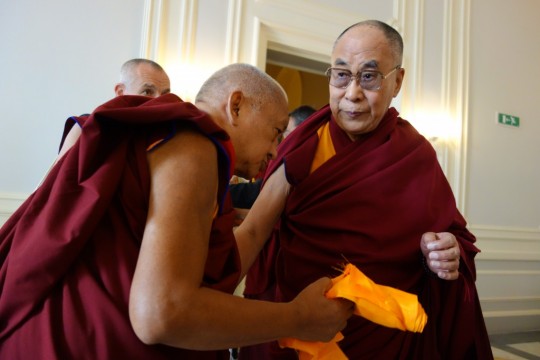
His Holiness the Dalai Lama and Lama Zopa Rinpoche at Istituto Lama Tzong Khapa, Italy, June 2014. Photo by Ven. Roger Kunsang.
Offerings to Gurus and Sangha
Offerings are made to all of Lama Zopa Rinpoche’s gurus:
- His Holiness the Dalai Lama
- His Holiness the Sakya Trizin
- Jhado Rinpoche
- Khongla Rato Rinpoche
Offerings are made to over 15,650 Sangha:
- Sera Je and Sera Mey Monasteries
- Gaden Jangtse and Shartse Monasteries
- Drepung Gomang, Loseling, and Deyang Monasteries
- Gyurme and Gyuto Tantric College
- Kopan Monastery and Kopan Nunnery
Offerings are made to Sangha at International Mahayana Institute (IMI) communities:
- Nalanda Monastery, France
- Thubten Shedrup Ling, Australia
- Istituto Lama Tzong Khapa, Italy
- Chenrezig Institute, Australia
Offerings Made to Holy Objects in Nepal, India, and Tibet
- Bouddhanath and Swayambunath Stupas: Offering white wash and four giant saffron flower petals and new umbrellas to the stupas’ pinnacles
- Buddha inside the Bodhgaya Mahabodhi temple: Offering a new set of robes of the most precious material
- Jowo Buddha in Lhasa’s Jokhang: Offering gold to the holy face of the Jowo Buddha
Prayers and Practices for FPMT Students
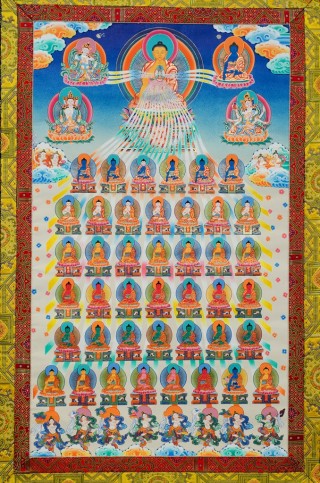
Thirty-five Confessional Buddhas thangka.
On Buddha Multiplying Days, such as Saka Dawa, karmic results are multiplied by one hundred million, as cited by Lama Zopa Rinpoche from the vinaya text Treasure of Quotations and Logic.
Lama Zopa Rinoche advises that any beneficial practices can be done. In particular, Lama Zopa Rinpoche has recommended:
- Recitation of the names of the Thirty-Five Confession Buddhas
- Vajrasattva mantras
Practices specifically recommended by Rinpoche for Buddha Multiplying Days include:
- Taking the eight Mahayana precepts
- Doing nyung nä retreats
- Performing the Guru Shakyamuni Buddha puja
- Reciting the Sutra for Remembering the Three Jewels
Of course, any other meritorious activities often advised by Lama Zopa Rinpoche are also good to do on these days, such as recitation of the Sanghata Sutra, the Sutra of Golden Light, etc., with extensive dedications. These texts are available on our sutras page.
In addition, you might consider including children in your Buddha Multiplying Day celebrations and reading Eight Plays for Children. This book of charming and easily produced plays for children contains tales of wisdom and kindness from Buddha’s past lives as animals as well as his life as Prince Siddhartha.
The ceremony for taking the eight Mahayana precepts can be found in the “Morning Prayers” section of Essential Buddhist Prayers, Vol. 1 or in the text The Direct and Unmistaken Method. We have a beautiful color cover glossy booklet for nyung nä, complete with instructions for how to do the practice.
Rejoice!
All are welcome to participate in all of this beneficial activity by imagining all of these practices and offerings happening around the world and then mentally offering everything oneself and/or rejoicing. Students can also make a financial contribution to the many prayers, practices, and offerings sponsored by the FPMT Puja Fund.
The Puja Fund was established by Lama Zopa Rinpoche to provide resources for continuous pujas dedicated to the long life of His Holiness the Dalai Lama and to the success of all the FPMT centers, projects, services, students, benefactors and those serving the organization in any way.
Learn more about the Puja Fund or FPMT’s other extensive charitable activity.
- Tagged: buddha day, holy day, puja fund, saka dawa
3
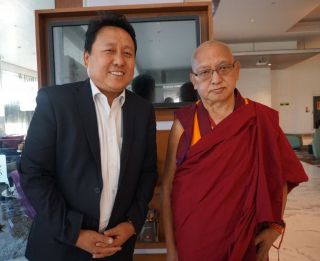
Lama Zopa Rinpoche with Chief Representative Chophel Thupten.
The Central Tibetan Administration (CTA) is an organization based in India with the stated goals of “rehabilitating Tibetan refugees and restoring freedom and happiness in Tibet.” The CTA attends to the welfare of the Tibetan exile community in India, who number around 100,000. It runs schools, health services, cultural activities and economic development projects for the Tibetan community as well as assists with legal issues which might arise for Tibetans in exile. More than 1,000 refugees still arrive each year from China, usually via Nepal.
Lama Zopa Rinpoche, through the Lama Zopa Rinpoche Bodhichitta Fund, recently offered a grant to the CTA office in Bangalore (known as the CTA South Zone). Chief Representative Chophel Thupten explained that it is quite difficult to fundraise for administrative and upkeep needs of the office, but the needs are vast. Rinpoche was very happy to help in this way and offered half of the amount needed for upcoming expenses.
Lama Zopa Rinpoche Bodhichitta Fund enables Rinpoche’s compassionate service to others to flourish. All the offerings from the fund are used toward the creation of holy objects around the world; sponsoring young tulkus, high lamas and Sangha in India, Nepal, Tibet and the West; supporting FPMT centers, projects and services; sponsoring Dharma retreats and events; funding animal liberations, and much more.
31
Life-Saving Surgeries for the Dear Animals in Nepal
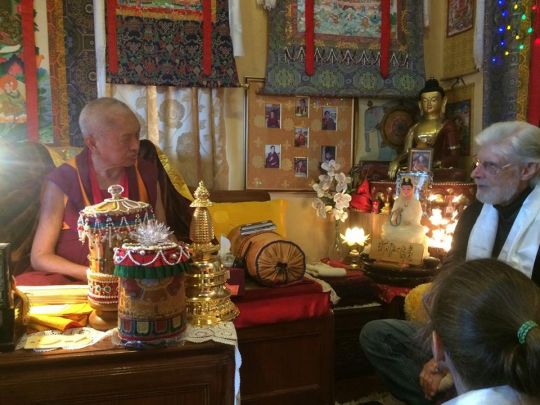
Lama Zopa Rinpoche discusses the suffering of animals and how to help them with Dr. Howard Ralph and Tania Duratovic.
In March of this year, Tree of Compassion brought veterinarian Dr. Howard Ralph to the Animal Liberation Sanctuary in Nepal to perform critical surgeries on animals who would otherwise suffer and die without them.
The visit also gave Dr. Howard the opportunity to assist with other animals at the sanctuary, give lectures for veterinary students in Kathmandu and help a local animal shelter with some difficult cases.
Every year around the world, millions of animals die or suffer needlessly. In countries such as Nepal, the care and management of animals is particularly poor. Nepal is still home to a number of festivals in which animals are violently and brutally ritually slaughtered each year. The Animal Liberation Sanctuary benefits animals by sparing them from impending death and suffering but they are also are exposed to Dharma teachings, regularly hear mantras, and are led around holy objects to create merit for their next life and purify their minds. This work also allows those who support the work the chance to create merit and purify life-obstacles.
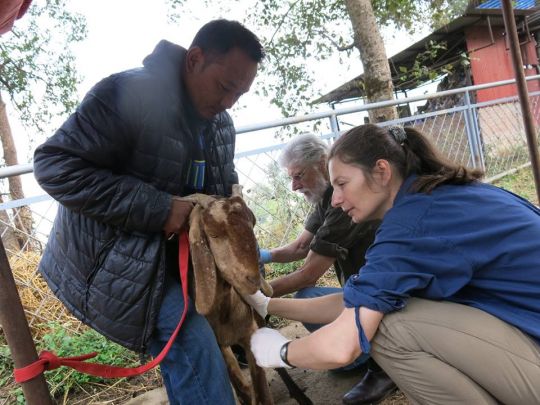
Dr. Ralph examines Nyingjey the goat after surgery with Animal Sanctuary coordinator Tania Duratovic and manager Pema.
You can watch a short video about one goat named Osel’s surgery. Osel’s fractured leg was fixed with surgery which hopefully means he won’t lose his leg.
Last week, Dr. Howard Ralph was presented with an Alumni Award for Services to Humanity from the Sydney University Veterinary Science department. This recognition is very deserved for a man who gives his time and expertise so tirelessly to animals in need.
Please rejoice in the ongoing compassionate work of the Animal Liberation Sanctuary for many animals in Nepal who would simply die or live lives of terrible suffering if not for the sanctuary’s kind care.
All are welcome to contribute to the work of the Animal Liberation Sanctuary.
The Animal Liberation Fund supports weekly animal liberations and extensive dedications offered by Sangha at the residences of Lama Zopa Rinpoche. When funds allow, additional animal liberations conducted in Singapore and Hong Kong are supported, as well as efforts to save the lives of animals at the Animal Liberation Sanctuary in Nepal, MAITRI Charitable Trust in India and elsewhere. You are welcome to offer any amount toward this ongoing work.
//fpmt.org/projects/fpmt/alf/
27
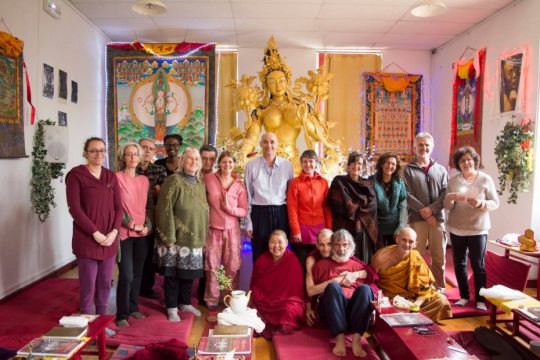
Nyung nä participants in front of the altar at IVY, France.
Seven dedicated individuals are in the process of finishing 108 nyung nä retreats at Institute Vajra Yogini (IVY), France. One of Lama Zopa Rinpoche’s Vast Visions for the FPMT organization is to sponsor others to complete 1,000 nyung nä retreats. Upon hearing of this incredible vision of Rinpoche’s, IVY immediately started hosting 108 nyung nä retreats a year.
Lama Zopa Rinpoche, through the Practice and Retreat Fund, is very pleased to be able to sponsor ten people with food and accommodation each time there is a 108 nyung nä retreat at IVY. Support is also provided by IVY and kind private donors.
At the mid-way point of this round of nyung näs, IVY reported: “If we add up everybody so far we count that eighty-five different participants in total have participated in one or more nyung näs from mid-November to the beginning of March and 664 individual nyung näs have already been accumulated. On average, we have between seven to twenty people participating in each single session of the nyung näs.”
About this retreat practice Rinpoche commented, “Nyung näs take such a short time, but bring strong purification. So many eons can be purified in this life; it makes it so easy to have attainments.”
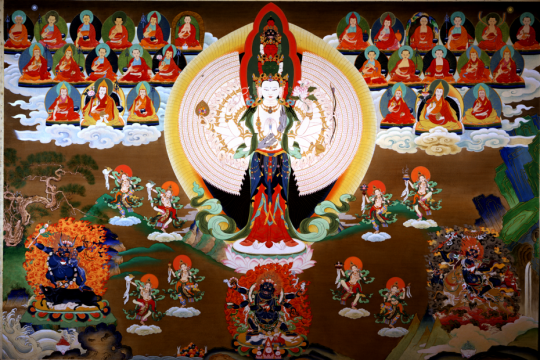
The nyung na merit field.
Nyung nä practice is an intensive two-day purification retreat that includes fasting, precepts, prostrations, prayers, mantra recitation, and offerings. Nyung nä is a practice based on the deity, 1,000 armed Chenrezig, the Buddha of Compassion, and is extremely powerful for healing illness, purifying negative karma, and opening the heart to compassion.
Incredibly, this is the seventh round of 108 nyung näs to be completed at IVY with the compassionate and dedicated guidance of retreat leader Ven. Charles Trebaol.
Ven. Charles has had a strong and beneficial impact on those who have engaged in the nyung nä retreat at IVY. It is difficult to comprehend the service Ven. Charles is offering to the IVY community, Lama Zopa Rinpoche, and all sentient beings by leading these difficult retreats every year with such commitment.
Retreatant Ven. Tenzin Sangpo said:
“In my eyes, Ven. Charles is the embodiment of love and compassion. I feel sometime that we in the west are are always looking for a spiritual masters very far from us in exotic places while, actually, we have one, here, under our noses.”
Another participant, Valentino Giacomin shared this experience with Ven. Charles:
“One day, during the prostration session, I turned to see if there were any tissues on a shelf for my cold. An action of a few seconds. There were not. I continued my prostrations. After a minute, someone touches my shoulder. I turn. Ven. Charles is there with the tissues I was looking for! Regularly I forget something while in my “prostration zone” (glasses, pens, etc.) and promptly Ven. Charles returns my “lost things.” I do not know how he can perceive everything and be so careful despite the commitments he has and the responsibility to guide the (difficult) retreat which is almost nine hours a day.”
Jean-Yves Barralis, acting director of IVY had the following to say about the retreats:
“As the acting director, I must say that each time I am amazed at how people who come for one or two sessions are so thankful about doing this practice. How they feel so welcomed by the long-term retreatants who take care of them by explaining the practice, giving advice, and offering love….
An inspiring interview with Ven. Charles about his years in retreat, “The Hermit of the Pyrenees,” was published in Mandala magazine, March 1998.
The Practice and Retreat Fund provides grants and sponsorships for students engaged in retreats such as 108 nyung nä retreats, 100 million mani retreats, recitations of sutras and long term retreat.
- Tagged: institut vajra yogini, nyung nä
23
Sponsorship of Light Offerings to Holy Objects
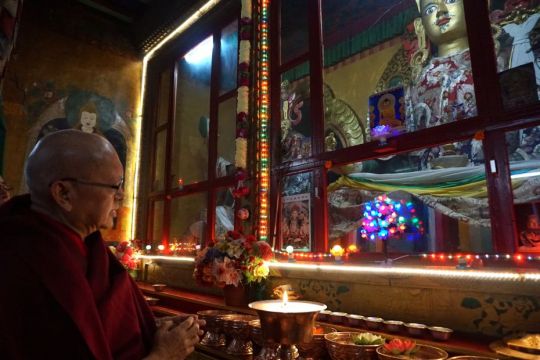
Lama Zopa Rinpoche with the large light offering to Guru Rinpoche statue in Chailsa, Nepal.
Lama Zopa Rinpoche often explains the benefits of offering to holy objects and encourages extensive offerings around the world. “We are not aware of the limitless skies of benefits we achieve from the practice of offering, what we can achieve and enjoy from life to life,” Rinpoche explains in Extensive Offering Practice to Accumulate the Most Extensive Merit. “Even while you are in samsara, you enjoy good rebirths, wealth, and every happiness. Even just the samsaric perfections are amazing, without adding all those incredible realizations that allow us to offer deep benefit to sentient beings, liberating them from oceans of samsaric suffering and its cause, delusion and karma.”
We’d like to invite you to rejoice in just some of the extensive light offerings which Lama Zopa Rinpoche sponsors through the FPMT Puja Fund.
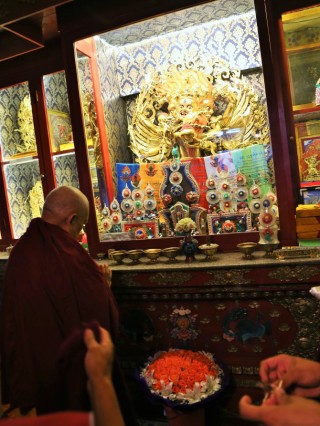
Lama Zopa Rinpoche making offerings to the Hayagriva statue on the altar at Idgaa Choizinling College in Mongolia.
Bodhgaya, India: Recently while in Bodhgaya, Lama Zopa Rinpoche was pleased with the extensive light offerings arranged on the roof of the apartment he occupies when there. The electricity for the offerings has now been sponsored for the entire year so they can remain on at all times.
Chailsa, Nepal: The cost of butter for one year was recently sponsored to a light offering in front of a very special Guru Rinpoche statue in Chailsa, Nepal.
Mongolia: The electricity for lotus light offerings is offered to all the holy objects on the altar at Idgaa Choizinling College in Mongolia. The lights are offered 24 hours a day, 365 days a year. Among the holy objects on this altar is an incredible Most Secret Hayagriva statue.
Garsha, India: All the butter is offered to keep alight a brass butter lamp in front of a holy self-emanating image of Chenrezig in a cave in Garsha, India.
Lama Zopa Rinpoche’s residences in USA: Extensive light offerings are made daily by the Sangha at Rinpoche’s residences in California and Washington State. Additionally, many other daily practices are offered at Rinpoche’s residences including animal liberation practice, flower and water bowl offerings, and protector practices.
Please rejoice in these offerings and also feel very free to use them in your own practice by mentally offering these light offerings.
The Puja Fund was established by Lama Zopa Rinpoche to provide resources for pujas and offerings dedicated to the long life of His Holiness the Dalai Lama and to the success of all the FPMT centers, projects, services, students, benefactors and those serving the organization in any way. You can learn more about the Puja Fund, or FPMT’s other extensive charitable activity.
- Tagged: extensive light offering, light offering, puja fund
16
An Incredible Accomplishment: An Endowment Supporting the Monks of Sera Je Monastery Long into the Future
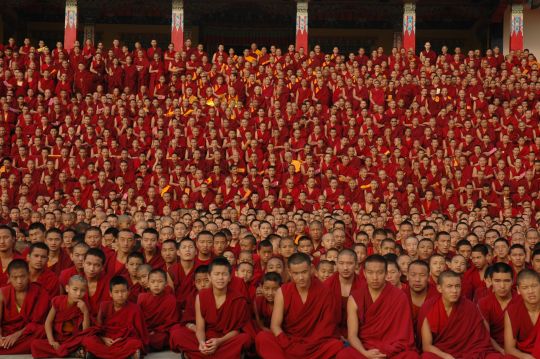
The monks of Sera Je Monastery.
For the last ten years FPMT International Office has been building an endowment large enough to support the long-term health of the Sera Je Food Fund, whereby the interest from the endowment would cover the annual costs associated with offering three nutritious meals daily for all the monks of Sera Je Monastery, for as long as the endowment remains.
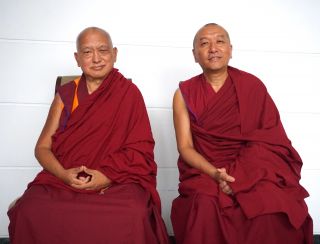
Lama Zopa Rinpoche with the new abbot of Sera Je Monastery, Ven. Choesang Rinpoche.
Amazingly, due to the kindness of so many generous donors, we have now reached our targeted amount for the endowment fund. This is a monumental achievement and we could not have done it without all of the kind, generous, and ongoing support that has been offered to the Sera Je Food Fund for the last twenty-six years. Thank you!
This is an incredible accomplishment for the entire FPMT organization. Lama Zopa Rinpoche started the Sera Je Food Fund in 1991 on the occasion of Tenzin Ösel Rinpoche entering Sera Je Monastery. Rinpoche wanted to make an offering to the whole monastery, not just one time, but continuously. At the time it seemed like such an ambitious plan to offer meals to every monk studying at Sera Je Monastery every day of every year. In 2017 this amounts to an incredible 700,000 meals per year, 2,900 meals per day.
Thanks to the support of so many people, this fund operated without interruption for twenty-six years. In the beginning we were only able to offer a small amount of money to each monk for their midday meal. Then we started to provide a cooked meal that was served to every monk. Later we added dinner, and then breakfast. We built a kitchen and catered to the thousands of monks every day with special attention given to maintaining a hygienic environment for meal preparation, and a balanced offering of nutritious food.
When Rinpoche first mentioned his wish to start this project, we had no idea how we were going to make it happen. Lama Zopa Rinpoche and Ven. Roger Kunsang were the main fundraisers for so many years. Then slowly FPMT International Office took on the entire responsibility so Rinpoche didn’t have to personally raise the funds. In addition, a few centers were key in helping with fundraising and tens of thousands of supporters over the years have also been inspired to donate. Each year we covered the annual costs and eventually were able to create an endowment fund so the project could continue to run on the interest accrued each year.
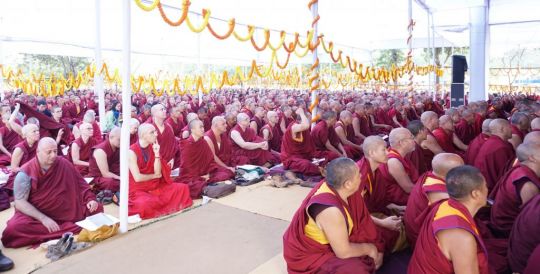
Sangha participating in the long life puja offered to Lama Zopa Rinpoche at Sera Je Monastery. January, 2017.
At the beginning of this year, the abbot and monks of Sera Je Monastery offered a long life puja to Lama Zopa Rinpoche to thank Rinpoche and the FPMT organization for this incredible offering made over a quarter of a century. At that time we discussed with the monastery that the endowment and the ongoing management of the food fund now be managed entirely by Sera Je Monastery.
FPMT has always had a close connection with Sera Je Monastery. Most of our resident geshes come from this highly respected monastery and we are very happy to make such a substantial offering. It’s also wonderful that the monastery is now able to manage this next chapter.
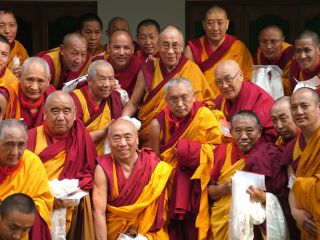
His Holiness the Dalai Lama with Lama Zopa Rinpoche and many geshes who were serving as resident teachers in FPMT centers at the 2007 Geshe Conference organized by FPMT.
We are working to ensure that this transition is smooth and that the endowment and ongoing interest raised will be exclusively used for the food fund. The official handover of the project began in May 2017 and the endowment will be transferred over a period of a few years. Therefore the Sera Je Food Fund is no longer an FPMT charitable project.
Please rejoice in this incredible offering, the benefits of which will continue long into the future. Every person who has contributed to the Sera Je Food Fund — whether with donations, time, or prayers — all of this incredible merit of offering to the Sangha will continue to grow and benefit.
The Next Chapter in Supporting Sangha
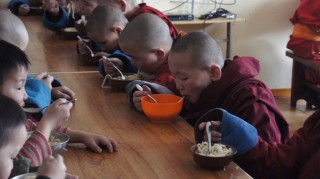
The monks of Idgaa Choizinling College are offered lunch every day through the Supporting Ordained Sangha Fund.
Supporting monks and nuns has always been one of the highest priorities for Lama Zopa Rinpoche and the FPMT organization because the preservation of the Buddhadharma is dependent on the existence of Sangha.
We invite you to please join us in developing the Supporting Ordained Sangha Fund which is offering support to monasteries, nunneries, and individual monks and nuns for food, accommodation, health care, education and practice.
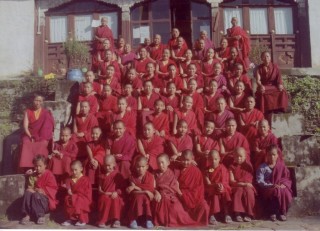
Since 2009 we have offered support to the nuns of Tashi Chime Gatsal Nunnery, Nepal.
This fund is not limited to any one institution and able to benefit many nunneries, monasteries and Sangha in need.
From our hearts we sincerely thank you for helping to actualize this incredible offering. May the food fund and endowment continue to grow and benefit the Sangha at Sera Je Monastery for as long as space endures and as long as sentient beings remain.
“Offering even one cent to the Sangha community brings uncountable benefit and merit. As long as the Sangha community exists your merit exist. It will not be exhausted.” — Lama Zopa Rinpoche
You can learn more about the Supporting Ordained Sangha Fund and the ways it supports monasteries and nunneries.
9
Progress Made on Mani Chungyur, Stupa, and Water Park
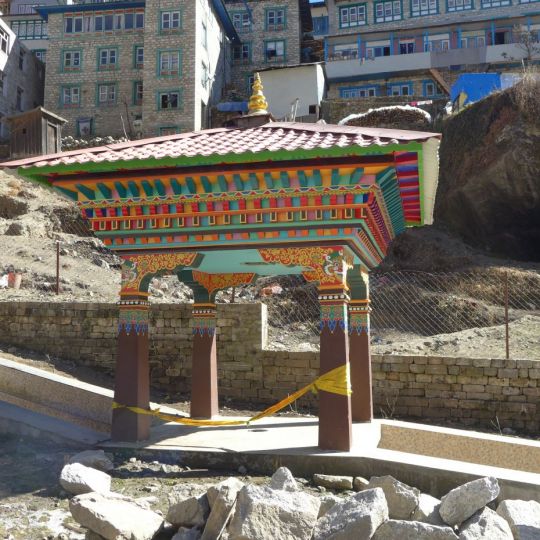
Beautiful hand-painted houses for the prayer wheels. Photo by Laura Miller.
Last year, the Holy Objects Fund offered a substantial grant to the Mani Chungyur, Stupa, and Water Park, a project being built in Namche Bazaar, Nepal, located in the Sagarmatha National Park and Buffer Zone (SNPBZ). The grant is being used for five prayer wheels which will be turned by flowing water, thus blessing all of the water used throughout the entire park. This project is also a restoration of original prayer wheels and artwork and will become a tourist attraction that is beneficial for the visitors.
Mandala Publication’s managing editor Laura Miller recently visited the park and reports that all appeared to be finished except for the actual prayer wheel installation. She also commented, “It was beautiful and amazing to see. The fresh water rushing down the hill, through the houses for the prayer wheels and the fountain shooting a spray of water up.”
The park is attending to practical as well as spiritual needs of the community. The water from the water park runs under a small bridge to a laundry area. In this way, locals can bring their washing to be cleaned in the blessed water!
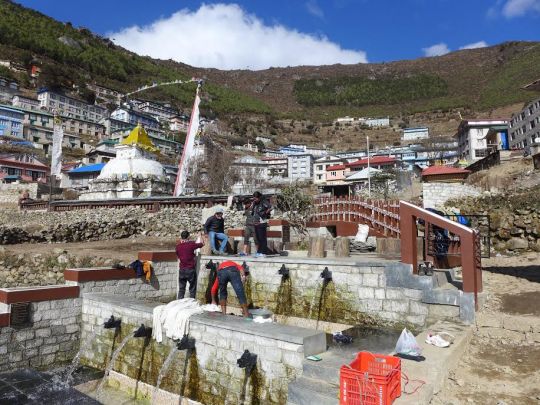
The water from the water park runs under a small bridge to the laundry area. Photo by Laura Miller.
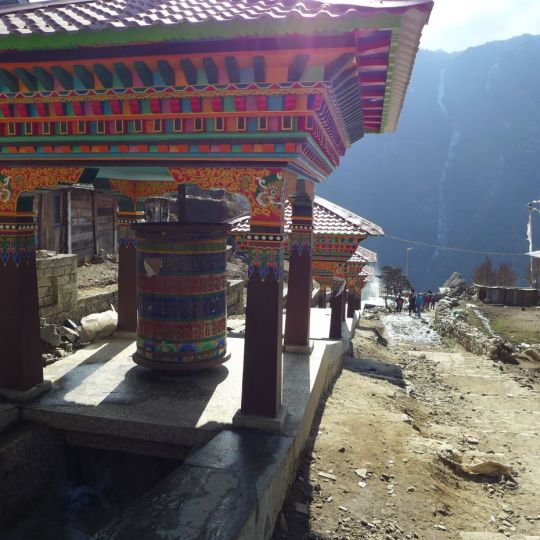
Five restored prayer wheels are being installed in the new park. Photo by Laura Miller.
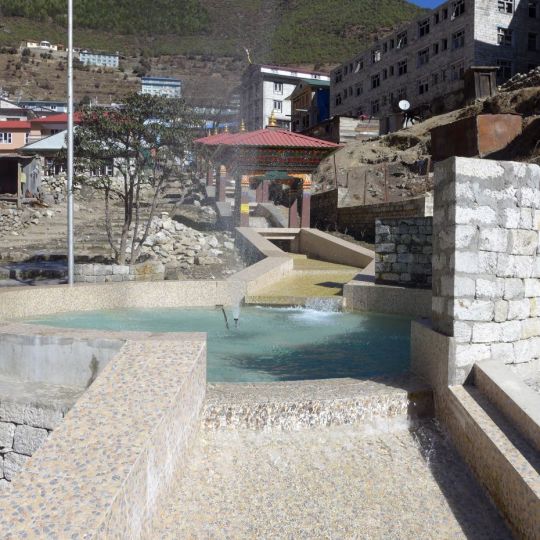
The prayer wheels will be turned by flowing water. Photo by Laura Miller.
Please rejoice in the progress of the new Mani Chungyur, Stupa, and Water Park which will bring so much benefit to residents of Namche Bazaar and tourists alike due to the incredible power of the prayer wheels.
If you would like to contribute to the building of holy objects around the world, you are welcome to offer any amount to the Holy Objects Fund which contributes to the creation of stupas, prayer wheels and statues.
- Tagged: holy objects, namchee bazaar, prayer wheel fund, prayer wheels
- Home
- News/Media
- Study & Practice
- About FPMT Education Services
- Latest News
- Programs
- New to Buddhism?
- Buddhist Mind Science: Activating Your Potential
- Heart Advice for Death and Dying
- Discovering Buddhism
- Living in the Path
- Exploring Buddhism
- FPMT Basic Program
- FPMT Masters Program
- FPMT In-Depth Meditation Training
- Maitripa College
- Lotsawa Rinchen Zangpo Translator Program
- Universal Education for Compassion & Wisdom
- Online Learning Center
- Prayers & Practice Materials
- Overview of Prayers & Practices
- Full Catalogue of Prayers & Practice Materials
- Explore Popular Topics
- Benefiting Animals
- Chenrezig Resources
- Death & Dying Resources
- Lama Chopa (Guru Puja)
- Lama Zopa Rinpoche: Compendium of Precious Instructions
- Lama Zopa Rinpoche: Life Practice Advice
- Lama Zopa Rinpoche Practice Series
- Lamrim Resources
- Mantras
- Prayer Book Updates
- Purification Practices
- Sutras
- Thought Transformation (Lojong)
- Audio Materials
- Dharma Dates – Tibetan Calendar
- Translation Services
- Publishing Services
- Teachings and Advice
- Find Teachings and Advice
- Lama Zopa Rinpoche Advice Page
- Lama Zopa Rinpoche: Compendium of Precious Instructions
- Lama Zopa Rinpoche Video Teachings
- ༧སྐྱབས་རྗེ་བཟོད་པ་རིན་པོ་ཆེ་མཆོག་ནས་སྩལ་བའི་བཀའ་སློབ་བརྙན་འཕྲིན།
- Podcasts
- Lama Yeshe Wisdom Archive
- Buddhism FAQ
- Dharma for Young People
- Resources on Holy Objects
- Ways to Offer Support
- Centers
- Affiliates Area
- Teachers
- Projects
- Charitable Projects
- Make a Donation
- Applying for Grants
- News about Projects
- Other Projects within FPMT
- Support International Office
- Projects Photo Galleries
- Give Where Most Needed
- FPMT
- Shop
Translate*
*powered by Google TranslateTranslation of pages on fpmt.org is performed by Google Translate, a third party service which FPMT has no control over. The service provides automated computer translations that are only an approximation of the websites' original content. The translations should not be considered exact and only used as a rough guide.From the Buddhist point of view, attachment for something means that it’s very difficult for us to separate from it. We have a very strong attachment – strong like iron – for the things we think of as being very good. We need to learn to be flexible.









